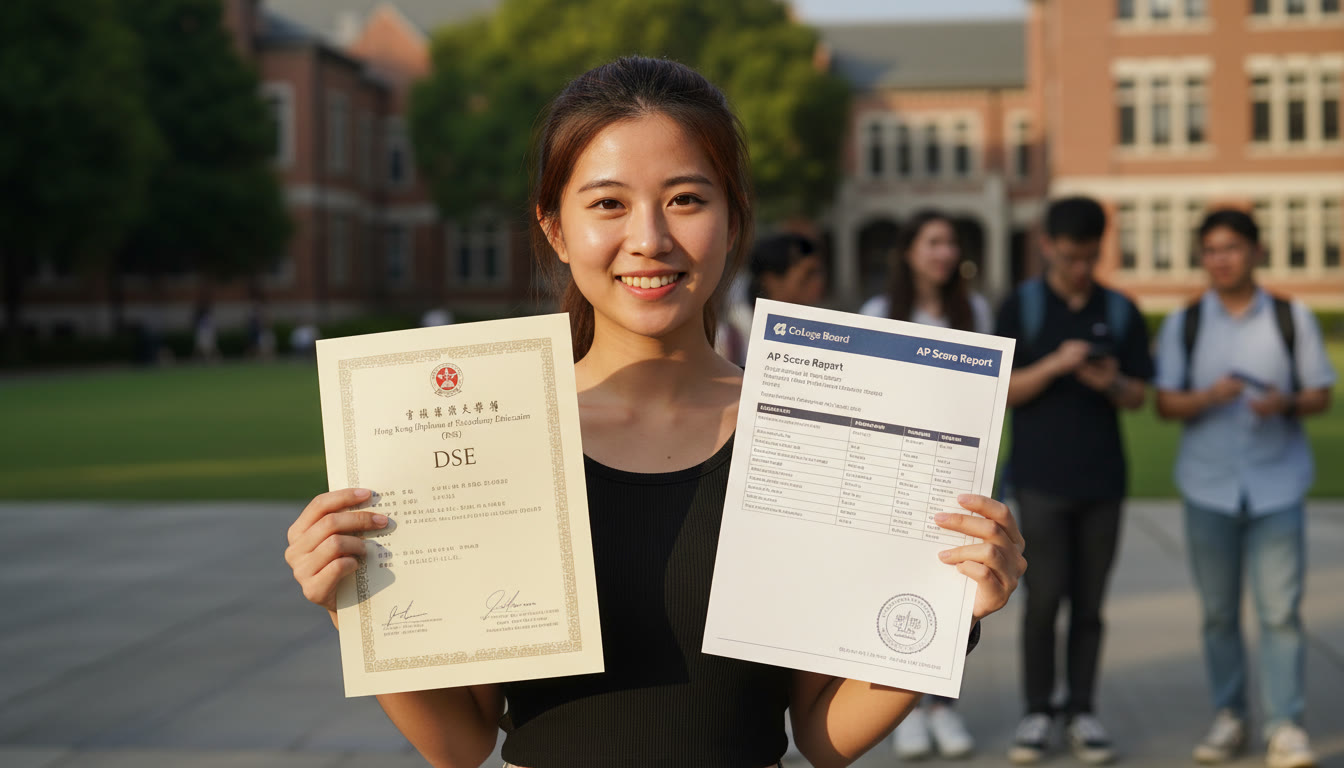Introduction — Two Pathways, One Goal
Students in Hong Kong increasingly face a choice (or a combination) of two rigorous assessment pathways: the Hong Kong Diploma of Secondary Education (DSE) and College Board Advanced Placement (AP) exams. Both open doors to competitive universities, but they have different rhythms, recognition patterns and strategic uses. If you or your child are navigating DSE and AP together, this guide gives practical, up-to-date-feeling advice on how recognition generally works, how to schedule smartly, and how to plan with confidence.
Why Students Take Both DSE and AP?
There are a few common reasons families choose to pursue both:
- Flexibility for international admission: AP exams are broadly recognized by universities in the U.S. and many other countries, while DSE is the standard credential for Hong Kong universities and a key benchmark for local admission.
- Academic stretching and subject depth: APs let ambitious students demonstrate university-level depth in particular subjects (Calculus AB/BC, Physics, Biology, etc.).
- Backup and bridging: Strong AP results can sometimes compensate for a weaker DSE subject score when applying abroad, and vice versa.
- Scholarship and placement opportunities: Top AP scores may be used in awarding merit scholarships or granting advanced placement in university courses.
How Recognition Typically Works — A Practical Overview
Recognition is a two-part question: (1) Will universities accept APs (or DSE) for admission, and (2) will they grant credit or placement? The short answer is: many universities in the United States, Canada, Australia and some in Asia accept AP scores either for admission consideration, course placement or credit. Hong Kong universities primarily evaluate applicants on DSE results but often welcome additional evidence of academic strengths — including AP scores and SAT/ACT where relevant.
Admissions vs Credit: Know the Difference
- Admissions consideration: AP scores are used by admissions committees to evaluate academic rigor and subject proficiency.
- Course credit or placement: Many universities award first-year course credit or allow skip-level placement for high AP scores (commonly 4 or 5), though policies vary by institution and department.

Typical Scheduling: When Do These Exams Happen?
Understanding timing is one of the most practical steps you can take. Knowing typical exam months helps you avoid clashes and build a study calendar that balances both systems.
| Exam | Typical Month(s) | Frequency | Notes for Hong Kong Students |
|---|---|---|---|
| DSE (HKDSE) | Usually April–June | Once per academic year | Main high-stakes local exam; results used for HK university admissions and local scholarships. |
| AP Exams (College Board) | Usually May (main administration) with some alternate dates | Offered once per year with limited alternate administrations | Often scheduled in May which can overlap with DSE preparation; some subjects have both morning and afternoon sessions. |
| AP Late/Alternate (where offered) | June or August in select locations | Limited availability | Not widely available everywhere — check local testing centers for specific offerings. |
Note: exact dates vary each year and testing centers in Hong Kong publish exam schedules in advance. If you plan to take both, start by mapping DSE paper dates and AP exam dates for the year you will test, then build backward with milestones for content mastery, timed practice, and revision.
Practical Scheduling Strategies — Make the Calendar Work for You
Here are pragmatic approaches students use to take both DSE and AP without burning out.
- Front-load APs in earlier school years: Many students take APs in Grade 11 (S5 equivalent) to avoid direct clash with DSE-focused Grade 12. Early APs can also relieve pressure during the DSE year.
- Choose AP subjects that align with DSE strengths: For example, if a student excels in DSE Biology, taking AP Biology can double as both depth and backup evidence for overseas applications.
- Spread AP exams across available sessions: If you must take multiple APs in a single year, avoid stacking difficult science APs on the same week.
- Use mock exams as scheduling litmus tests: Simulate DSE and AP timetables during mocks to understand energy and focus patterns.
- Reserve the final revision months for DSE if it’s the primary goal: Because DSE results are pivotal for local admissions, many families treat the final months before DSE as sacrosanct study time.
Sample Two-Year Plan
Below is a compact plan many students adapt. This is a template — tailor it to subject choices and personal stamina.
- Grade 11 / S5: Take 1–3 AP exams (subjects that complement DSE subjects). Begin deeper DSE alignment mid-year.
- Between Grade 11 and Grade 12: Review AP outcomes, decide whether re-sitting any AP is necessary.
- Grade 12 / S6: Focus on DSE full-time, take any remaining APs only if they don’t disrupt DSE prep (or if alternate AP dates are available).
How Universities View Combined DSE + AP Profiles
Admissions teams appreciate clarity, demonstrated mastery, and consistency. A student with strong DSE scores and high APs signals both solid local grounding and the ability to handle college-level material. But remember:
- Different countries and universities weigh credentials differently. U.S. universities often treat APs as advantageous for admission and credit; Hong Kong institutions prioritize DSE for local placement.
- Some universities have explicit conversion tables or score equivalencies — others evaluate holistically.
- High-level AP scores (typically 4 or 5) may translate into course credit; a 3 might earn placement but not credit at some schools.
Application Tips
- Include AP scores or indicate registered APs on your application if exams fall after your application submission—this shows ongoing academic effort.
- For major-specific programs (engineering, medicine, business), highlight AP subjects relevant to your intended field.
- Use personal statements and teacher recommendations to explain why you combined DSE and AP — admissions committees respond to clear narratives about intellectual curiosity and planning.

Common Concerns and How to Address Them
1. Will APs reduce focus on DSE?
Only if scheduled poorly. That’s why planning matters: pick APs early or in off-peak DSE months, set realistic targets (e.g., one subject per semester), and prioritize DSE when necessary. Many students find AP study reinforces core knowledge used in DSE, especially in sciences and mathematics.
2. Are APs worth it if I want to study locally in Hong Kong?
Yes — APs can add depth to your profile, be useful for overseas admission, and sometimes enhance scholarship prospects. However, for local admission to UGC-funded programs, DSE remains central — so don’t let APs detract from DSE performance.
3. How many APs should I take?
Quality over quantity. Two to four well-prepared APs that match your strengths and intended major are usually more persuasive than a long list of hurried attempts. Admissions officers value strong scores over many low or moderate ones.
Study and Test-Day Tips: Making Each Exam Count
- Master the format: DSE papers and AP exams test different skills: DSE leans on exam technique and calibration across multiple papers, while many APs include free-response sections that assess depth. Practice both styles.
- Use past papers wisely: For DSE, past papers are gold—practice full timed papers. For AP, past free-response questions and scoring guidelines reveal what examiners reward.
- Simulate conditions: Full timed mocks build stamina. Schedule at least one full-day mock that mirrors your DSE + AP calendar.
- Health matters: Prioritize sleep, nutrition, and micro-reviews rather than last-minute cramming. Cognitive resilience beats all-nighters.
How Personalized Tutoring Helps — Where Sparkl Fits In
Combining DSE and AP preparation is a strategic project: it benefits from tailored pacing, expert subject guidance, and adaptive feedback. Personalized tutoring helps in three ways:
- 1-on-1 Guidance: Tutors can create a realistic schedule that avoids exam clashes and targets weak spots.
- Tailored Study Plans: A tutor who understands both DSE and AP nuances can align content so studying one subject supports both exams.
- Data-Driven Insights: Modern tutoring (including AI-driven feedback) flags patterns in practice tests so students improve faster and with less wasted effort.
Sparkl’s personalized tutoring model offers bespoke plans, expert tutors who know the DSE and AP landscapes, and tools to track progress — a combination many families find helpful when balancing dual pathways.
Sample Comparison Table: DSE vs AP — What to Expect
| Feature | DSE (HKDSE) | AP (College Board) |
|---|---|---|
| Typical Timing | April–June (annual) | May (annual), with limited alternates |
| Assessment Style | Multiple papers per subject; a mix of multiple-choice and structured/essay responses | Mixture of multiple-choice and free-response; one exam per subject |
| Primary Use | Local university admissions and scholarship consideration in Hong Kong | International admission consideration; course credit or placement at many universities |
| When to Take | Final year of secondary education (S6) for many students | Often in Grade 11 or 12 (S5–S6) depending on schedule |
| Credit/Placement | Not typically for university credit in HK; used for admission benchmarking | Possible credit/placement at many international universities with high scores |
Real-World Examples and Scenarios
Here are a few stylized examples that illustrate common pathways. They’re not prescriptive, but they help show how decisions are made.
- The Balanced Applicant: Takes AP Calculus AB and AP Biology in Grade 11, achieves 4s and 5s. In S6 focuses on DSE and achieves strong results. Uses APs to strengthen U.S. applications and DSE for local options.
- The Local-Focused Student: Prioritizes DSE, takes one AP (English Language) to show extra rigor. Uses Sparkl to design a targeted AP micro-plan so DSE prep remains primary.
- The Specialist: Aiming for STEM abroad, this student schedules AP Physics C and AP Calculus BC early, re-sits an AP if needed, and times DSE revision around AP dates.
Checklist: Action Steps for Families
- Map the exam calendar for the year you’ll test. Mark DSE dates first, then AP dates.
- Prioritize subjects: choose APs that reinforce DSE strengths or future major.
- Create a two-year study roadmap — include content milestones, mock exams, and recovery weeks.
- Use past papers and AP free-response scoring rubrics for targeted practice.
- Seek expert advice early — a few tutoring sessions (for example with a provider like Sparkl) can save months of inefficient study.
- Keep wellbeing front and center: regular sleep, breaks, and short exercise spur better retention.
Final Thoughts — Strategy, Not Stress
Juggling DSE and AP is a marathon, not a sprint. When done thoughtfully, the two systems complement each other: DSE anchors your local credentials and university options in Hong Kong, while APs demonstrate international readiness and can unlock credit or placement abroad. Start early, make choices aligned with strengths and goals, and keep your schedule realistic. Where needed, personalized tutoring and data-driven practice smooth the path — giving students the clarity and confidence to do their best.
Whether you’re a student balancing textbooks and past papers or a parent building a supportive plan, remember that careful planning, consistent practice, and timely guidance make all the difference. Good luck — you’ve got this.















No Comments
Leave a comment Cancel